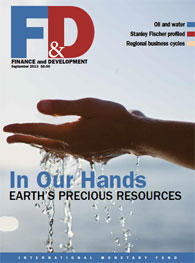
Typical street scene in Santa Ana, El Salvador. (Photo: iStock)
IMF Survey : Managing Resources a Careful Balancing Act, Says IMF’s F&D
August 29, 2013
- Resource wealth must be managed carefully to create growth
- Balance spending now with investment in future
- Sustainable investing tool helps policymakers scale up public investment
Natural resources are a mainstay of many economies, and the revenue derived from their export can help countries improve the lives of their citizens. But it’s usually more complicated than that, says the IMF’s Finance & Development (F&D) magazine.

Workers unload coal from railway trucks in Halong Bay, Vietnam. Countries rich in resources must manage the profits carefully (photo: Jenny Matthews/Alamy)
NATURAL RESOURCES
Sometimes revenue riches are squandered, or the wrong groups benefit, harming the economy as a whole. The September 2013 issue of F&D explores the challenges of natural resource management and proposes new ideas for sustaining resource revenues over the long haul to support steady economic growth and reduce poverty.
Wealth management
In “Too Much of a Good Thing?” IMF economists examine the challenges facing resource-rich countries. A new discovery of a precious natural resource—oil, coal, or a rare mineral, for example—always generates high hopes. Some resource-rich countries do fare well, but many others struggle to convert their resource wealth into growth engines that will benefit future generations.
An abundance of precious natural resources is no guarantee of sustained growth over the long haul, caution the authors. Economists have explored many explanations for this. Some blame corruption, exposure to volatile commodity prices, or “Dutch disease,” whereby a booming resource sector chokes off growth in other parts of the economy. Yet another reason is the exhaustible nature of certain resources—an oil well runs dry, a coal mine stops producing.
Developing countries face particular problems managing their resource revenues. Their development needs call for more spending up front on immediate needs such as school supplies, malaria nets, and vaccination campaigns. But they also have huge unmet investments.
The authors say balanced management is the answer: use revenues to boost domestic savings and investment and smooth spending. They advocate the use of a sustainable investing tool developed by the IMF to help policymakers decide how best to allocate resource revenue between saving and investment.
In another article, “Extracting Resource Revenue,” Philip Daniel, Sanjeev Gupta, Todd Mattina, and Alex Segura-Ubiergo of the IMF’s Fiscal Affairs Department tackle the challenges of formulating tax and spending policies in revenue-rich countries. Among other things, they recommend that countries set up a resource fund—also known as a sovereign wealth fund—to save excess revenues.
Oil and water critical
In “A Drop in the Bucket,” Peter Gleick of the Pacific Institute looks at the economics of the one natural resource we can’t live without: water. He says water policy must balance development needs and economic considerations. Only if water is managed in an integrated fashion—taking into account access to safe water and sanitation, agricultural needs, political constraints, and climate-related risks—can the global community meet the complex demands on this essential resource.
F&D’s oil expert Thomas Helbling, division chief in the IMF’s Research Department, offers a peek into the future of oil markets. He says that the high prices we’ve seen in the past decade would normally signal an end to a boom, as happened in the early 1980s. But today many factors militate against a cut in oil consumption and demand is holding firm. And even long-term responses to technological improvements promise to be more gradual than in the past. Barring a dramatic change in the global economy, Helbling writes, we should not expect a significant change in either the supply or the price of oil.
Other articles in the magazine’s cover package by IMF economists address the elusiveness of economic recovery in response to natural resource booms, the promise of resource wealth to boost the frontier economies of central Asia, and capital flight associated with the natural resource sector.

Also in the September 2013 issue of F&D, Prakash Loungani profiles Stanley Fischer, whose achievements in the public, private, and academic spheres place him at the forefront of modern economics. Other articles examine whether Latin American growth can be sustained, why regional ties are trumping global factors in business cycles, how remittances affect economies more broadly, the special vulnerabilities of small states, and how strong balance sheets help banks sustain credit during crises.


